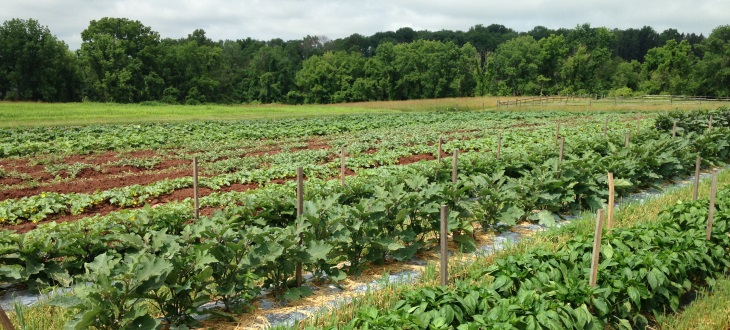The State We're In
Don’t cut funds for saving open space and farmland!
By Tom Gilbert, Co-Executive Director
Four years ago, residents of rural Warren County were shocked when a Pennsylvania developer announced plans to build 2.8 million square feet of warehouses on 600 acres of prime farmland in White Township.
From the local viewpoint, nothing about the Jaindl Land Co. plan made sense. High quality soils for growing crops would be destroyed forever, eliminating a source of local food. The site is far from the nearest major highway, meaning truck traffic would be routed along narrow, winding county roads. The property lacks infrastructure like public sewers and water.
Fortunately, New Jersey’s farmland preservation program came to the rescue earlier this month with an offer to permanently protect the property as farmland. Susan Payne, executive director of the State Agriculture Development Committee, indicated that her agency stands prepared to make offers to keep other farms from being lost to development.
New Jersey has the ability to protect properties like the farm in White Township thanks to its dedicated funding for land preservation.
In 2014, Garden State voters overwhelmingly passed a ballot question amending the state constitution to allow a percentage of the state’s Corporate Business Tax (CBT) to be used to preserve open space, city parks, farmland, and historic sites.
This steady and reliable funding source has been exactly what the nation’s most densely populated state needs. It allows New Jersey to protect vitally important lands that grow food, provide outdoor recreation, protect wildlife, safeguard clean water and air, and reduce the impacts of climate change. It lets the state buy out flood-prone residential properties and turn them into parks and open space, and clean up hazardous polluted sites.
But unless the State Legislature and Governor Phil Murphy act quickly, New Jersey could lose a huge chunk of this incredibly valuable funding source.
A CBT surcharge is set to expire at the end of 2023, triggering the loss of tens of millions of dollars annually for state, county, local and non-profit preservation efforts and severely reducing New Jersey’s ability to invest in residents’ health, safety and quality of life by preserving land.
A coalition of organizations committed to land conservation, agriculture, historic preservation, environmental protection, urban parks, and outdoor recreation are asking Governor Murphy and the State Legislature to restore the CBT surcharge.
According to the NJ Keep It Green Coalition, the state will lose over $60 million in environmental program funding annually, including $48 million for open space, farmland, flood protection, historic preservation and $12 million for community hazardous site cleanups. Over the coming decade, the losses would add up to about $436 million.
“The price of land is one of the largest challenges faced by the Green Acres Program, and cutting the program budget by tens of millions of dollars each year will undermine the state’s ability to provide all residents access to high-quality open spaces,” said a letter from the NJ Keep It Green Coalition.
The Coalition is also encouraging counties and municipalities to pass resolutions calling on the governor and the Legislature to restore the surcharge.
Without the CBT surcharge, the state may not be able to save prime farmland like the property in White Township when the need arises. It may also have to say no to much-needed projects to create new parks and open spaces in New Jersey’s cities.
For example, in Camden a partnership of nonprofits and government agencies are working to protect multiple properties to create a greenway along the Back Channel of the Delaware River. Located across from Petty’s Island, this greenway would give the public access to water-based recreation like fishing and kayaking. The project is complicated and state funding and partnership is critical to its success.
The CBT surcharge is a 2.5% tax on every dollar of corporate profits above $1 million. Eliminating it would benefit only the top 2 percent of big businesses – while hurting millions of New Jerseyans.
Let’s not forget that preserving parks and open space makes economic sense. Outdoor recreation and tourism – including fishing, kayaking, hiking, bicycling, bird-watching, hunting, boating, horseback riding and other sports – create jobs and bring in billions of dollars in revenue to outdoor-oriented businesses.
Green spaces also provide vital ecosystem services in a changing climate, helping to reduce extreme heat, stormwater runoff and flooding. As the old saying goes, an ounce of prevention is worth a pound of cure. Studies have shown that every $1 invested in New Jersey’s land preservation efforts returns $10 in economic value to the state.
Speak out for keeping the CBT surcharge in place! Please contact Governor Murphy and the state Senator and Assembly members serving your legislative district.
To see a copy of the sample resolution being considered by municipalities, go to https://anjec.org/action-alerts/. To find your legislators, go to www.njleg.state.nj.us/district-map.
And for more information on protecting New Jersey’s land and natural resources, visit the New Jersey Conservation Foundation website at www.njconservation.org or contact me at info@njconservation.org.
About the Authors
Alison Mitchell
Co-Executive Director
John S. Watson, Jr.
Co-Executive Director
Tom Gilbert
Co-Executive Director, 2022-2023
Michele S. Byers
Executive Director, 1999-2021
View their full bios here.
Filter
Get The Latest News
From The Garden State
In the
News

